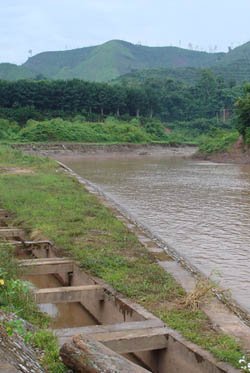Water Utilisation Programme

The Water Utilisation Programme (WUP) ran from 2000-2008 developing ‘procedures’ for water use that could be agreed upon by the four governments of the Lower Mekong Basin. These procedures were required under Articles 5, 6 and 26 of the 1995 Agreement on Cooperation for the Sustainable Development of the Mekong River Basin.
- Procedures for Data and Information Exchange and Sharing, approved 2001
- Procedures for Water Use Monitoring, approved 2003
- Procedures for Notification, Prior Consultation and Agreement, approved 2003
- Procedures for Maintenance of Flows on the Mainstream, approved 2006
- Procedures for Water Quality, endorsed by Joint Committee in 2006*
*The last of these procedures awaits consideration from the Council before final approval.

In designing these procedures the WUP improved shared water
use and management in the basin while promoting appreciation
of the importance of ecological balance. This was accomplished
through creation of an integrated knowledge base, provision
of data and decision support, plus a comprehensive hydrological
modelling package. In May 2007 an independent evaluation team
established that the WUP had been successfully implemented.
The WUP officially closes in March 2008 but its major achievements, the Decision Support Framework and the water use procedures, will continue to underpin the core of the MRC’s work. These tools, along with the experience gained through the six years of WUP modelling, training, data gathering and consultation, will be used extensively in the Basin Development Plan Programme Phase 2.
The Decision Support Framework is a suite of modelling tools capable of describing changes in river flow and assessing impacts that can occur as a result of land cover change, infrastructure development – mainly for irrigation and hydropower – and climatic variations within the basin. An important conclusion of the DSF is that it shows the Mekong flow regime to be highly robust: with good planning and management, there is much room for water resource developments that benefit all Member States and contribute to poverty reduction.
The process of creating such tools, and drafting and negotiating procedures for use of the Mekong, has been highly challenging and finally rewarding for the MRC. Completion of the WUP is seen as a positive experience which has resulted in the building of good working relations and increased trust amongst the Member States: it should have long-reaching positive effects that underpin cooperation in the Mekong Basin.
Choose a newsletter:
 Top
Top